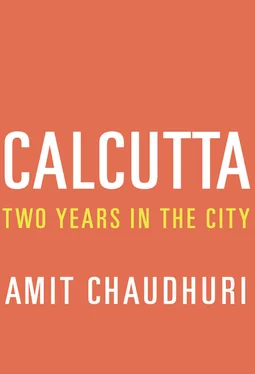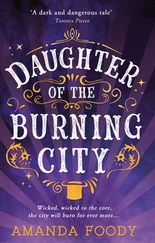Whenever I’m in Ramayan Shah’s stall in the afternoons — and it’s invariably afternoon, as I’ve used up my morning writing or practising music and then come straight here after lunch or a coffee at Flurys — I’m hot, and I’m also subtly aware, despite the heat, of the ebbing of the light. Afternoon’s the most dreamless and introspective time of day, a sort of midnight of the daytime, though you wouldn’t know that from the activity on Free School Street; but its span is also the shortest I know anywhere (as Calcutta is in the east), and, by half past five, you’re really preparing for the sudden advent — always unexpected — of evening. As I stand at Ramayan Shah’s, there’s a steady — and noisy — flow of congestion towards Park Street, and, even now, when it’s supposed to have been phased out of the city’s traffic, the hand-pulled rickshaw rolls onward, with an imperious shopper afloat. The rickshaw-pullers were said to be pimps and touts, and the way they made their function known to young men was through hungry eye-contact, and the muted clink of the bell in their palm. Further up, if you turn left after the second-hand record stalls and bookshops, you’ll come to New Market, or Hogg’s Market, for me, with its inexplicable and largely purposeless maze of shops, still the most enchanting covered market I’ve walked around in and, for short spells of time, been frustrated by. Free School Street is an old, important road; opposite the opening that leads to New Market is Calcutta’s main fire station. Further up, as the road ends, are the desperately impoverished Muslim families who live among debris and garbage, seemingly the preferred habitat of the swaggering, hirsute pigs they nurture. But parallel to Lindsey Street, on which New Market is situated, are the skeletal lanes with either quaint or seedy hotels in whose rooms European backpackers curl up, and who march in the short-lived afternoon (as transitory to Calcutta’s day as summer is to England’s year) towards Park Street, or march back from it, glancing momentarily in our direction as Ramayan Shah’s clientele and staff and neighbours and I exchange small talk cautiously.
* * *
Mid-December, and I was back in Park Street, having spent two and a half months in England, in Norwich. So I was doubly glad to be back in the setting I’d fantasised about there—“fantasise” may not be the right word, because it involves a degree of volition; while I suppose I’m talking about a random and involuntary yearning that would come to me during my stay in England. I don’t know where it came from, because I don’t actually like the Calcutta of today (of that, more shortly). Could it be a residue from my childhood, when, in Bombay, returning from the school I hated to the lovely, shining flat that was home, I thought constantly of Calcutta? These days, certain places and activities revisit me momentarily when I’m away, and, whatever I’m doing, I’m sucked into their memory: walking down Park Street, past Magnolia (a restaurant I couldn’t be persuaded to be caught dead in) and the stalls selling chewing gums and condoms, is one of them; settling down at a table at Flurys is another. Actually, I long for Park Street even when I’m not away; just now, as I write these words in my flat in Sunny Park, I feel a desire, like a muted undercurrent, to go to Park Street. In England, other pictures flash upon my eye, as part of that assortment that draws me homeward, towards Calcutta — which, as it happens, was never my home, and, I often feel, never will be. At least one of them is inexplicable: a spontaneous memory of The Good Companion, a spacious air-conditioned shop selling, mainly, frocks and dresses for children made by destitute women, managed by upper-middle-class ladies who want to do a bit of charitable work. What the particular pull of this memory is, I can’t tell; it could be that the shop has an unusual amount of space, and, invariably, relatively few customers, besides a society lady you might know vaguely, positioned behind the desk, speaking in perfect, commanding English; the juxtaposition of these elements might make it seem attractive and impossibly far in Norwich.
I was back in Park Street, and was buoyant for two reasons: First, for my proven ability to materialise yet again in the world that I (for some obscure but dogged reason) love. Second, I was irrationally, almost spitefully, cheered by the fact that I was back when it was increasingly going to be the best time to be in Calcutta (a week before Christmas) and, coincidentally, the worst time to be in Norwich. Decades of dispiriting travel between the two countries have made my experience of place not just comparative, but, occasionally, vituperative. Before the England — India divide that’s defined my life in the last twenty-five years, there was the Bombay — Calcutta one. When visiting Calcutta from Bombay, I would actually think to myself, “How glad I am not to be at home!” while, back from England, I overhear myself exclaiming in the first few days: “How glad I am to be back!”—literally, at intervals, congratulating myself. In other words, the associations of “home,” “away,” “return,” are quite hopelessly mixed up in my mind.
As I stepped out of Oxford Bookstore, my pace quickening as I turned in the direction of Music World, I found myself accompanied by a girl who’d been sitting on the pavement (there are always one or two people domiciled just outside the bookstore). I’d noticed, without paying attention, that she’d been sitting with an infant, a boy, both diverting themselves with what looked like a large, flat bottle meant for storing mineral water — a curious plaything. Seeing me come out of the shop, the girl immediately abandoned the infant and hurried after me. I thought I’d end her pursuit by giving her a few rupees; then it occurred to me that, since I was writing about the city, I may as well have a conversation with her. The thought, a contrived and implausible one, became more and more natural and plausible in a few seconds, when we began talking.
“Naam kya hai?”
She was briefly confused, and then probably made an assessment — that this man would be worth cooperating with in the interests of getting a few more rupees later. We kept up the conversation while steadily approaching the traffic lights, where I’d cross to Music World. She was anxious and waiflike, and wouldn’t have looked out of place in a page inside the National Geographic .
“Pooja,” she said.
“Do you live here?” I asked — meaning this area, Park Street; more precisely, the pavement outside Oxford Bookstore. She shook her head. She told me her des , her native place, was Uluberia — not a village or town at all, but a downmarket locality on the outskirts of the city, near Howrah, which can be classified as the beginning of the end of Calcutta. Did she live there with her parents?
No, she lived in front of Forum, the big mall that had come up on Elgin Road and altered that historical area (the mall, awash with radiance and activity till nine in the evening, was one of those locations I suddenly caught myself thinking about in the solitariness of Norwich). By now, Pooja — whose real name, I found out, was Shabnam (many poor Muslims, as we know, instinctively take cover under neutral-sounding Hindu names) — and I had crossed and reached Music World; here, sitting on a parapet before a Mama Mia stall — which claims to sell not ice cream, but “gelato”—I clumsily opened a notebook which I was carrying in case I encountered Ramayan Shah, and, glanced at by the beady-eyed magazine-sellers opposite and the slinky college kids who always gather here, taking stock of the situation or romancing, began to scribble Shabnam’s replies. Her brother — whom she’d left alone, daringly, in front of the bookshop — was called Nasir; she earned between ten and forty rupees each day; she (who was just ten) didn’t like her parents so much, preferring her grandparents, with whom she lived on the pavement outside Forum. Our conversation had made us conspicuous: not just to the magazine-sellers and the smarter, uniformed men behind the Mama Mia counter, but to other beggars, whose numbers had grown startlingly, in a matter of minutes.
Читать дальше












